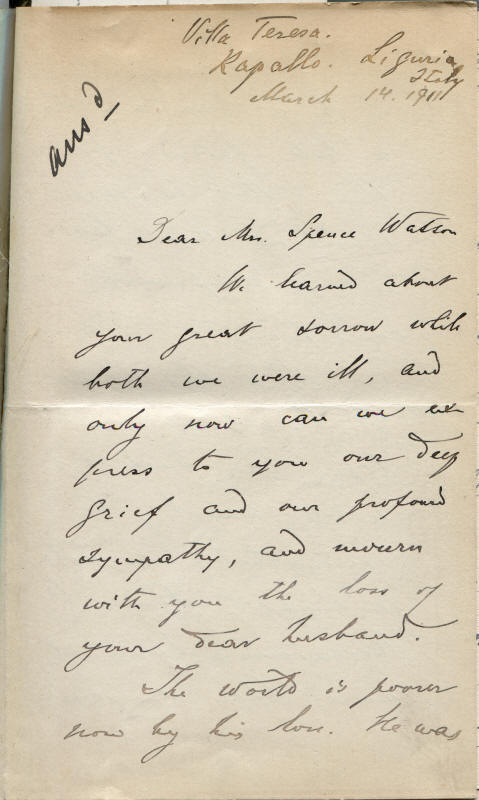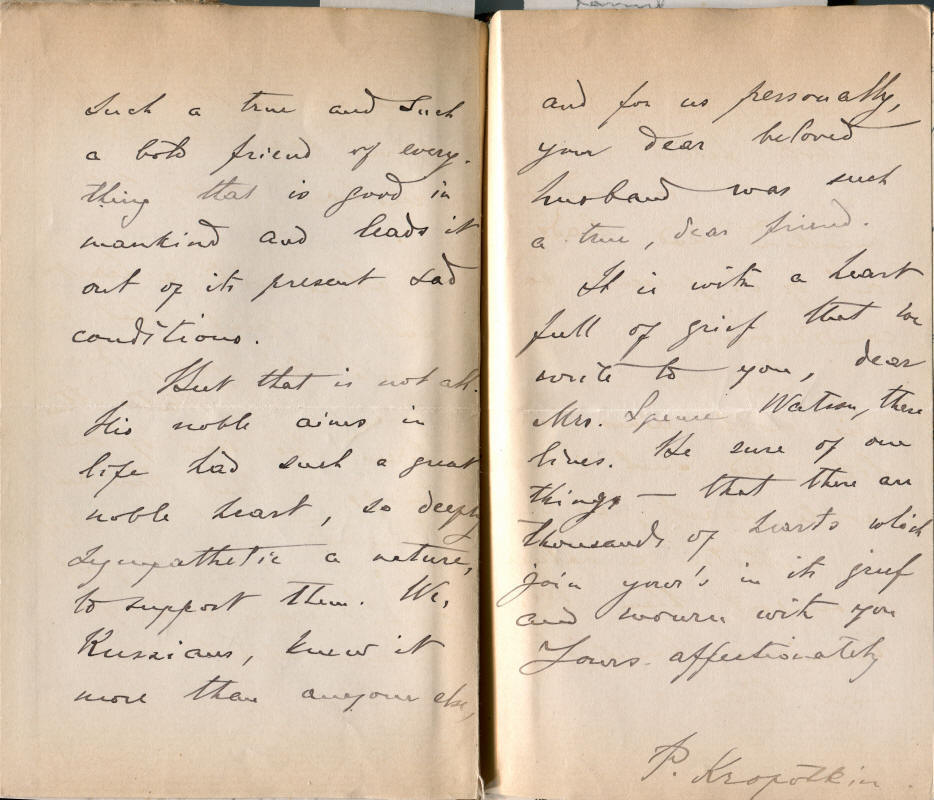Letters of sympathy on the death of Robert Spence Watson, 1911 |
|||||
|
Surviving letters of sympathy on the death of Robert Spence Watson were bound into seven volumes, of which one (marked as Vol. IV) is in my own possession. Vol. IV includes letters from (among others) James Bryce, Thomas Burt, Rosalind Carlisle, Millicent Garrett Fawcett, Earl Grey, Sir Edward Grey, John Morley, and the Cheriffa de Wazan. Of particular interest is that it also includes four letters from three of his associates in the Society of Friends of Russian Freedom, and I have chosen to transcribe these here. The correspondents were Peter Kropotkin, Fanny Stepniak (x 2), and Felix Volkhovsky.
Peter Kropotkin
Villa Teresa, Rapallo, Liguria, Italy March, 14, 1911 Dear Mrs. Spence Watson We learned about your great sorrow while both we were ill, and only now can we express to you our deep grief and our profound sympathy, and mourn with you the loss of your dear husband. The world is poorer now by his loss. He was such a true and such a bold friend of everything that is good in mankind and leads it out of its present sad conditions. But that is not all. His noble aims in life had such a great noble heart, so deeply sympathetic a nature, to support them. We, Russians, knew it more than anyone else, and for us personally, your dear beloved husband was such a true, dear friend. It is with a heart full of grief that we write to you, dear Mrs Spence Watson, these lines. Be sure of one thing—that there are thousands of hearts which join your's in its grief and mourn with you. Yours affectionately P. Kropotkin
Fanny StepniakOblomovka Norton Letchworth, Herts March 3 - 1911 Dear Mrs Spence Watson To day brought the sad news of Dr Spence Watson's death & I feel as if a dearest friend has left us. We, Russians, owe your husband a great debt of gratitude & we will cherish his memory. His life was a magnificent record of a fine statesman & noble humanitarian. Let the idea of his beautiful life devoted to a beautiful aim console you! I deeply sympathise with you, dear Mrs Spence Watson, in your great sorrow. Yours very sincerely Fanny Stepniak
Oblomovka Norton Letchworth, Herts March 28 - 1911 Dear Mrs Spence Watson It was very kind of you indeed to write me such a sweet letter & I appreciate it very much. The death of your husband made me think & think of my own loss . . . . . I remember what Stepniak said, when he first me Dr Spence Watson, how he was delighted to have made his acquaintance. Gradually he became more & more attached to your husband, of whom he always spoke with affection & enthusiasm. It was enough to mention the name of Dr Spence Watson to see his face lit up with love and joy. He confessed him to be one of his weaknesses. His friends are dear to me and you understand that such a loss affects me the more. I am so sorry to hear he suffered so much lately & perhaps for his sake eternal rest & peace is best! With greatest sympathy, Yours very sincerely F. Stepniak
Felix Volkhovsky
Dear Mrs Spence Watson, I had been away from home for over two months during which I saw no English papers, nor did I carry much correspondence, as I was very ill. Now that I feel much better after the treatment I have undergone abroad, I have returned home—only to learn of our great loss! I cannot tell you how keenly I feel it. The bright, witty, amiable personality of Spence Watson,—so full of energy & of a sweet, strong wish to do all the good possible to mankind—stands vividly before me and makes me repeat in distress—"he is no more!" True, he is not gone from us altogether. His beautiful self will always live in our memories and in his own deeds. But the natural human selfishness wants more—it misses the delight of the personal intercourse with him & that makes one sad. Let me mentally press your hand, dear lady, in recognition of our common loss and assure you that I am one with you in your bereavement. Yours ever F. Volkhovsky
|
|||||
| © Benjamin S. Beck, 2012–2023 | |||||

